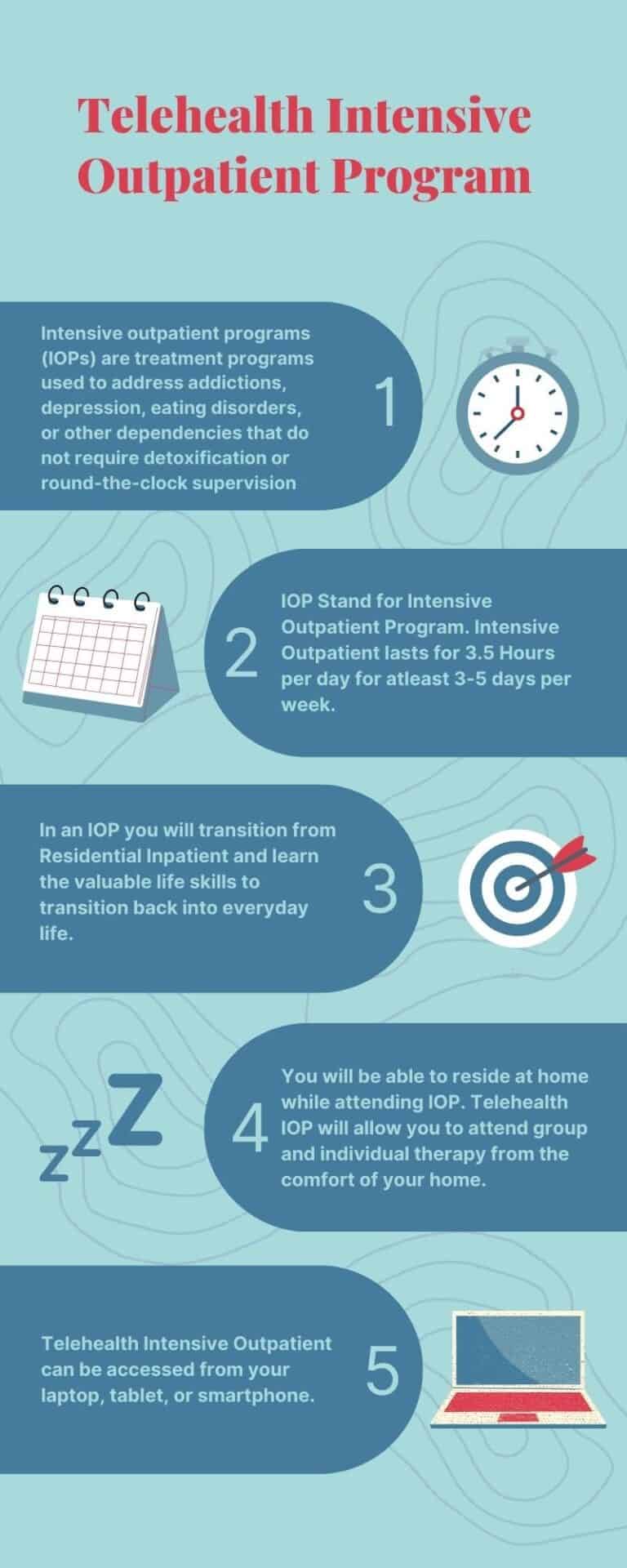Just How an Intensive Outpatient Program (IOP) Can Support Your Mental Health And Wellness Trip.
Just How an Intensive Outpatient Program (IOP) Can Support Your Mental Health And Wellness Trip.
Blog Article
Navigating the Intricacies of Dual Diagnosis Therapy Within an Extensive Outpatient Program Establishing
In the realm of psychological wellness and addiction therapy, the crossway of twin medical diagnosis presents a nuanced difficulty that requires a comprehensive and tailored approach. Within the boundaries of an Extensive Outpatient Program (IOP) setup, the complexities of resolving co-occurring psychological health problems and material use problems need a delicate equilibrium of know-how and resources to browse. The integration of evidence-based techniques, collaborative efforts among multidisciplinary teams, and an eager understanding of the distinct needs of each individual are important elements in efficiently taking care of twin diagnosis within an IOP framework. By discovering the details of dual diagnosis treatment within this extensive outpatient context, a more clear course arises in the direction of holistic and lasting recovery for those coming to grips with these intertwined challenges.
Double Medical Diagnosis Introduction
What is the value of comprehending twin diagnosis in mental health treatment? Twin diagnosis refers to the co-occurrence of a substance use condition and a mental wellness condition in an individual. It is critical to identify and address this comorbidity as it can considerably influence the performance of psychological wellness treatment. Without correct recognition and management of both conditions, individuals may have a hard time to attain long lasting healing and stability.
Understanding double diagnosis is important as it requires an extensive and integrated method to treatment. By recognizing the interaction between substance use and psychological health and wellness, medical care carriers can customize interventions to meet the distinct demands of each individual. This holistic technique not just addresses signs but additionally targets hidden elements that add to the twin diagnosis.
Moreover, unattended twin medical diagnosis can result in a cycle of relapse and getting worse psychological health and wellness signs. By identifying the complexity of double diagnosis and providing specialized treatment, medical care professionals can support people in accomplishing long-lasting healing and improved psychological wellness.
Tailored Treatment Strategies
Acknowledging the elaborate interaction between substance usage conditions and mental health conditions, the advancement of tailored therapy plans is extremely important in addressing the complexities of twin diagnosis in psychological health and wellness therapy. Customized therapy strategies are customized methods that consider the unique requirements, obstacles, and objectives of individuals facing double medical diagnosis. These plans are developed collaboratively by a multidisciplinary group of professionals, including psychoanalysts, psychologists, social employees, and dependency experts, to make sure detailed and integrated treatment.
Tailored therapy strategies typically include a combination of therapies, medications, and behavior treatments that target both the material usage disorder and the mental health and wellness condition all at once. These plans might include cognitive-behavioral treatment, dialectical habits treatment, medication-assisted treatment, individual counseling, group treatment, and family treatment, amongst various other evidence-based treatments. By personalizing treatment strategies to individual situations, customized plans can resolve the root causes of twin medical diagnosis, promote long-term healing, and enhance total lifestyle for people dealing with co-occurring conditions.
Integrated Care Technique

Furthermore, the social element of integrated treatment entails attending to ecological elements that might contribute to the growth or perpetuation of compound usage and mental wellness concerns. This can consist of family members dynamics, real estate instability, or absence of social assistance. By incorporating social treatments like family therapy, occupation support, and neighborhood sources, the therapy becomes extra alternative and customized to the person's particular demands. Overall, an incorporated treatment technique in double medical diagnosis therapy within an extensive outpatient program setup aims to provide detailed, efficient, and individualized like people facing co-occurring conditions.
Obstacles in IOP Establishing
In the context of explanation dual medical diagnosis therapy within an intensive outpatient program, navigating the intricacies of co-occurring material use problems and psychological wellness conditions offers significant challenges. Among the primary difficulties in the IOP setup is the sychronisation of treatment in between mental health specialists and substance misuse specialists to make certain an extensive therapy technique. This needs effective interaction, cooperation, and a deep understanding of how these conditions engage and influence each other.
Additionally, the changing nature of substance usage problems and psychological health conditions includes one more layer of complexity - Intensive Outpatient Program (IOP). Customers in an IOP may experience abrupt shifts in their symptoms or compound food cravings, needing prompt treatment and change of therapy techniques. Balancing the intensity of treatment and support while allowing clients the adaptability to manage their daily duties can be a fragile stability to preserve
Additionally, resolving stigma and resistance to treatment within the IOP setup can impede progress. Some individuals might be hesitant to divulge their twin medical diagnosis or might really feel ashamed, impeding their engagement in the healing procedure. Getting rid of these barriers demands a helpful and non-judgmental setting that cultivates depend on and visibility.

Collaborative Specialist Efforts

Joint initiatives also extend to regular communication and details sharing among team participants to ensure from this source a cohesive therapy technique. Inevitably, a joined front of professionals working with each other boosts the performance of twin medical diagnosis treatment within an intensive outpatient program.
Verdict
Finally, reliable dual diagnosis therapy within an intensive outpatient program setting requires tailored treatment strategies and an incorporated care strategy. Challenges may develop in this setting, yet collaborative efforts among specialists can assist navigate these complexities. By dealing with the unique demands of individuals with co-occurring psychological wellness and substance make use of problems, IOP programs can give detailed and all natural treatment to support recuperation and overall wellness.
Report this page